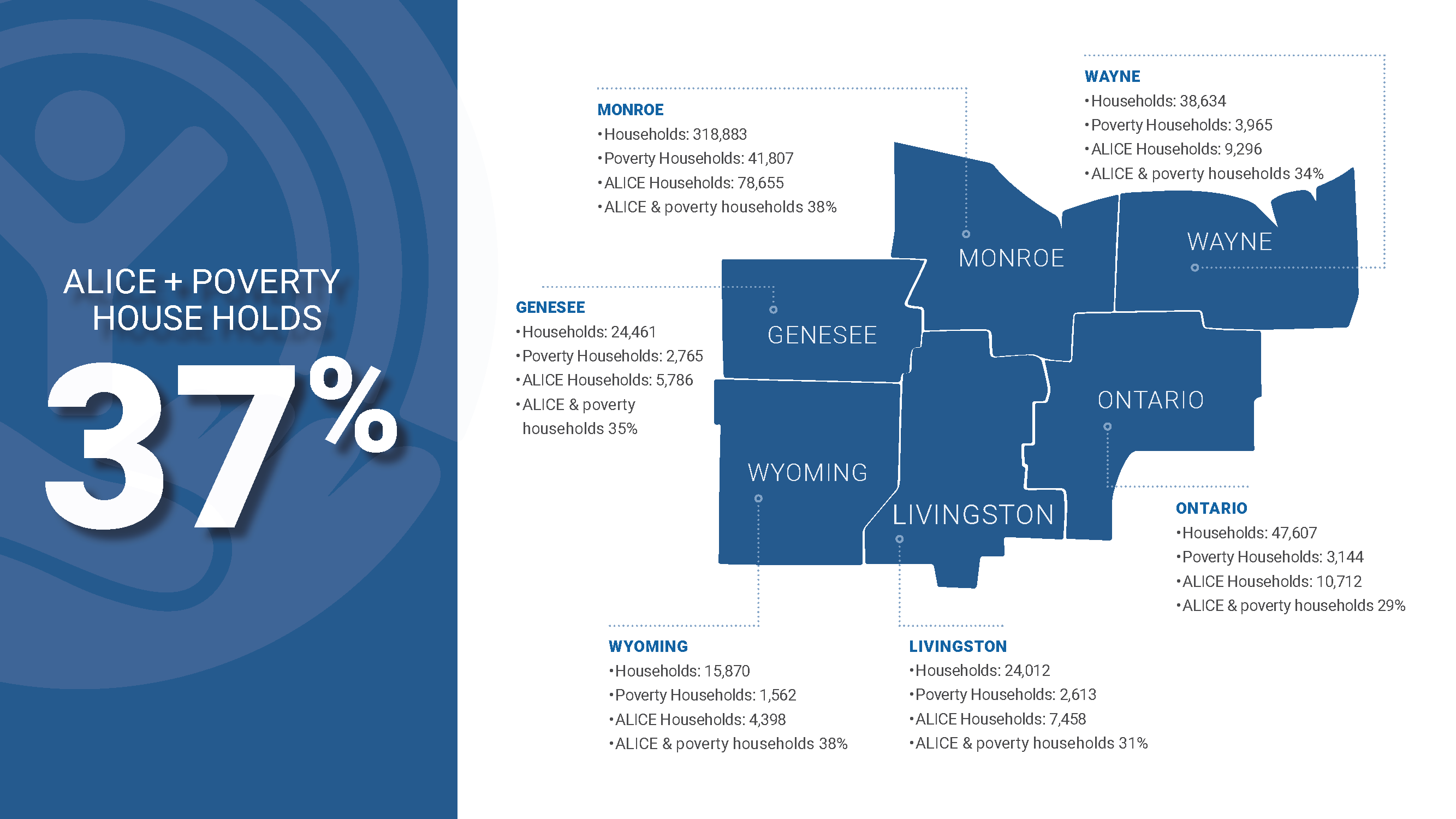Pandemic Impact: More Rochester and Finger Lakes Households Financially Insecure
New ALICE Report shows pandemic aids temporarily blunted the financial crisis, yet warning signs are on the horizon
The ranks of households unable to afford the basics in the Rochester and the Finger Lakes region (Genesee, Livingston, Monroe, Ontario, Wayne and Wyoming counties) increased during the first two years of the COVID-19 pandemic, resulting in a total of 172,161 households or 37% struggling to afford the basics by 2021, up from 29% in 2019, according to a new report from United Way of Greater Rochester and the Finger Lakes and its research partner United For ALICE.
That calculation includes the 55,856 households in poverty as well as another 116,305 families defined as ALICE (Asset Limited, Income Constrained, Employed), earning above the Federal Poverty Level but less than what’s needed to survive in the modern economy. ALICE families have been overlooked and undercounted by traditional poverty measures. ALICE is the nation’s child care workers, home health aides and cashiers heralded during the pandemic – those working low-wage jobs, with little or no savings and one emergency from poverty.
ALICE in the Crosscurrents: COVID and Financial Hardship in New York shows that the total number of financially insecure households rose by 1% between 2019 and 2021 – 44% of the overall state’s population are below the ALICE Threshold of Financial Survival. The number of ALICE households increased by 16,165 during that time. In contrast, there were 73,386 more families in poverty.
“This is not about others. This is about all of us,” said United Way President and CEO Jaime Saunders. “ALICE is the sobering reality that many of our coworkers, neighbors, and families struggle to make ends meet. At United Way, we are driven to ensure everyone has the opportunity to thrive, and the ALICE data is another tool for us to understand and mobilize for longer term solutions.”
While job disruptions and inflation delivered significant financial pain, a combination of pandemic supports and rising wages did help to blunt what could have been a deeper financial crisis, the report finds. However, as some benefits are peeled back, and inflation persists, signs of greater financial stress are on the horizon.
“A positive change during the pandemic was that tax credits, stimulus payments and rental assistance were available for ALICE households and provided strong relief,” said United For ALICE National Director Stephanie Hoopes, Ph.D. “However, as some of these supports come to an end, growing food insufficiency and other indicators reveal continued stress. Ignoring these warning signs places ALICE, our economy and the well-being of our communities at great risk.”
According to the report, for a family of four with an infant and a preschooler, the annual ALICE Household Survival Budget, which is the basic cost needed to live and work in the Greater Rochester and Finger Lakes region was $75,470 in 2021. The Child Tax Credit and Child Dependent Care Tax Credit helped to soften the blow, bringing the family Survival Budget down to $73,605.
Additional report insights include:
- Racial disparities persist in the rates of financial hardship; 59% of Black and 47% of Hispanic households were below the ALICE Threshold in 2021, compared to 34% of white households in the Greater Rochester and Finger Lakes region.
- American Indian/Alaska Native had among the highest rates of hardship. Over half – 64% – of New York’s American Indian/Alaska Native households could not afford basics in 2021.
To read the report and access online, interactive dashboards that provide data on financial hardship at the state, county and local level, visit United4ALICE.org/ALICECrosscurrents.
About United For ALICE
United For ALICE is a driver of innovation, research and action to improve life across the country for ALICE (Asset Limited, Income Constrained, Employed) and for all. Through the development of the ALICE measurements, a comprehensive, unbiased picture of financial hardship has emerged. Harnessing this data and research on the mismatch between low-paying jobs and the cost of survival, ALICE partners convene, advocate and collaborate on solutions that promote financial stability at local, state and national levels. This grassroots ALICE movement, led by United Way of Northern New Jersey, has spread to 27 states and includes United Ways, corporations, nonprofits and foundations in Arkansas, Connecticut, Delaware, Florida, Georgia, Hawai‘i, Idaho, Illinois, Indiana, Iowa, Kansas, Louisiana, Maine, Maryland, Michigan, Mississippi, New Jersey, New York, Ohio, Oregon, Pennsylvania, Tennessee, Texas, Virginia, Washington, Washington, D.C., West Virginia and Wisconsin; we are United For ALICE. For more information, visit: UnitedForALICE.org.

About United For ALICE
United For ALICE is a driver of innovation, research and action to improve life across the country for ALICE (Asset Limited, Income Constrained, Employed) and for all. Through the development of the ALICE measurements, a comprehensive, unbiased picture of financial hardship has emerged. Harnessing this data and research on the mismatch between low-paying jobs and the cost of survival, ALICE partners convene, advocate and collaborate on solutions that promote financial stability at local, state and national levels. This grassroots ALICE movement, led by United Way of Northern New Jersey, has spread to 27 states and includes United Ways, corporations, nonprofits and foundations in Arkansas, Connecticut, Delaware, Florida, Georgia, Hawai‘i, Idaho, Illinois, Indiana, Iowa, Kansas, Louisiana, Maine, Maryland, Michigan, Mississippi, New Jersey, New York, Ohio, Oregon, Pennsylvania, Tennessee, Texas, Virginia, Washington, Washington, D.C., West Virginia and Wisconsin; we are United For ALICE. For more information, visit: UnitedForALICE.org.